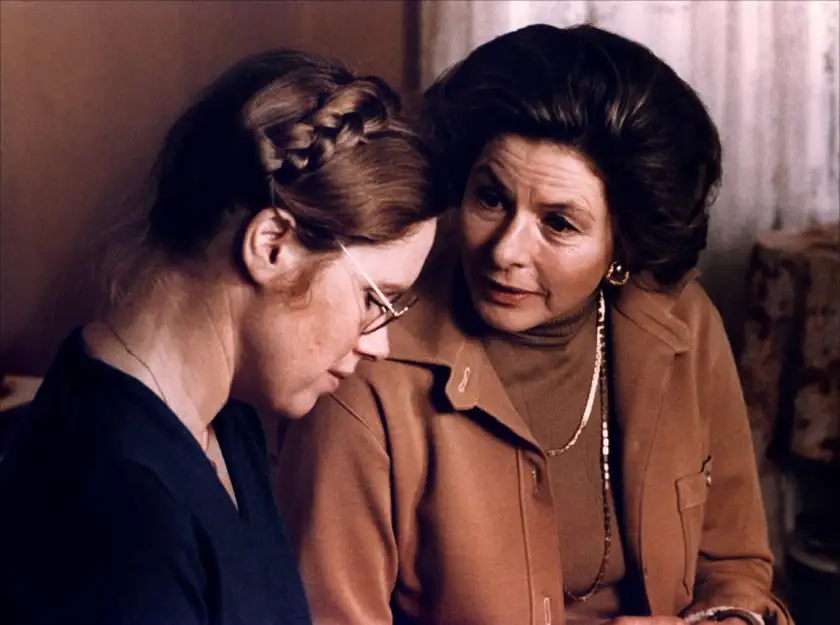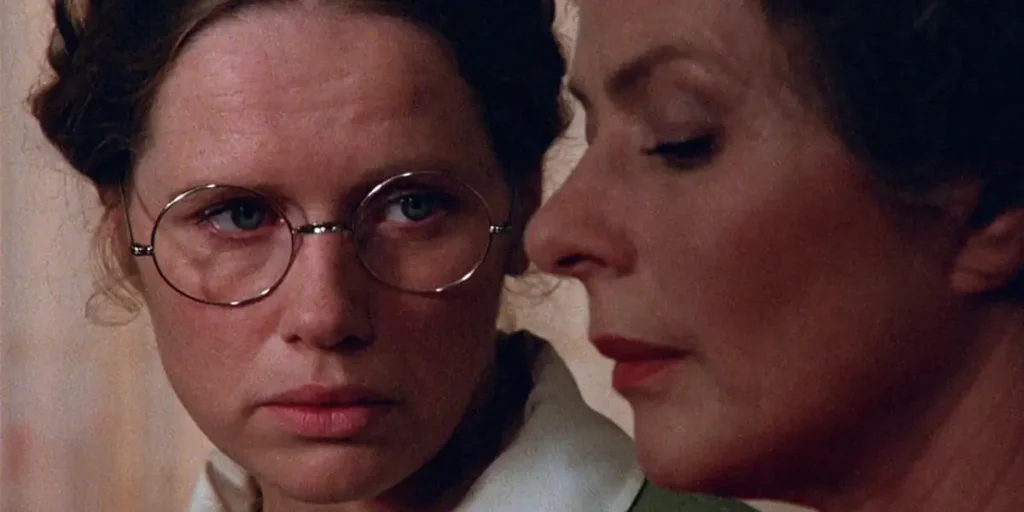Autumn Sonata is an intense, emotional portrait of a fractured mother-daughter bond that will break hearts.
Writer & Director: Ingmar Bergman
Genre: Drama
Run Time: 99′
U.S. Release: October 18, 1978
U.K. Release: March 1979
Where to Watch: On digital and on demand and on DVD & Blu-Ray
Ingmar Bergman’s films have a way of confronting us with our own humanity, laying bare the parts of ourselves we often prefer to ignore. From the existential dread of The Seventh Seal to the haunting introspection in Cries and Whispers, Bergman’s work digs into the deepest parts of our emotions. Yet, Autumn Sonata (Höstsonaten) stands apart for me. Among his many movies, this is the one that feels the most intimate, the most excruciatingly personal.
It’s a film that not only portrays family conflict but seems to inhabit it, pulling us into a world of unspoken grievances and wounded hearts with such precision that it leaves an ache. In Autumn Sonata, Bergman strips away any pretense, diving into the raw, volatile relationship between mother and daughter in a way that resonates deeply, long after the final scene fades.
At its core, Autumn Sonata is a study of two deeply flawed, hauntingly real women. Charlotte (Ingrid Bergman) is a celebrated concert pianist whose career has often overshadowed her role as a mother. Eva (Liv Ullmann), her daughter, is an introverted, sensitive soul who has spent years longing for her mother’s attention and validation, only to be met with neglect and dismissal. Their reunion is more than a chance to catch up; it’s an emotional reckoning, a night where years of resentment, jealousy, and longing are finally brought to the surface. What’s remarkable is how Bergman lets this tension simmer, allowing the characters to reveal themselves layer by layer, each revelation more devastating than the last.
The thematic weight of the film is immense. Autumn Sonata delves into the brutal complexities of family ties, the resentments that fester, the love that feels like obligation, and the longing that can never quite be fulfilled. Charlotte and Eva’s interactions are painful but incredibly human, highlighting the way parents and children often misunderstand each other in profound, irreversible ways. Bergman doesn’t shy away from this pain. Instead, he leans into it, creating scenes that feel almost intrusive, as if we’re eavesdropping on a conversation we were never meant to hear. It’s as uncomfortable as it is mesmerizing.

The performances by Ingrid Bergman and Liv Ullmann are nothing short of extraordinary. Bergman brings a guarded elegance to Charlotte, masking years of selfishness and denial behind a poised exterior. Ullmann, on the other hand, gives one of the most vulnerable performances of her career as Eva, a woman torn between love and resentment. There’s a scene where Eva finally confronts her mother about the years of neglect, baring her soul in a monologue so raw it feels like a confession. Ullmann’s performance is so authentic that you can feel the weight of each word, each pause. It’s as though Eva had been holding back her entire life, and we were witnessing her finally releasing it all.
Bergman’s visual choices amplify this intensity. The camera lingers on close-ups, capturing every flicker of emotion in Charlotte and Eva’s faces, forcing us to confront their pain head-on. The setting, a simple home bathed in warm but suffocating light, serves as the perfect backdrop—a place meant for comfort that instead becomes a battleground. Even the score, subtle yet persistent, mirrors the tension in the room, underscoring moments of silence and introspection in a way that feels deeply personal rather than cinematic.
What resonates most with me is the film’s honesty in portraying flawed characters. Bergman doesn’t idealize Charlotte and Eva; he doesn’t excuse their actions or offer easy redemption. Instead, he allows them to be complex, showing how love can coexist with bitterness, how apologies can come too late, and how forgiveness can feel impossible. There’s something profoundly relatable in this. We’ve all, in some way, experienced relationships that defy simple resolutions, that leave us wondering if we could have done things differently. Watching Autumn Sonata, I felt both empathy and frustration for these characters, understanding their pain but aching for them to bridge the distance between them.
In the end, Autumn Sonata is not a story of reconciliation but of revelation. It’s a reminder that some wounds are too deep to heal, that understanding doesn’t always lead to forgiveness. Bergman crafts a story that is brutally honest, yet in its honesty, there is beauty. The film lingers in your memory, its characters etched into your mind like old photographs. It’s a masterpiece that captures the contradictions of love and family in a way that only Bergman could, leaving us haunted, moved, and, perhaps, a little more understanding of our own imperfect connections.
Autumn Sonata is now available to watch on digital and on demand.

